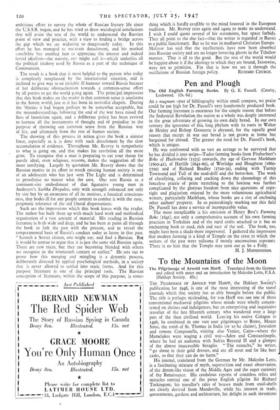Pen and Plough
As a magnum opus of bibliography within small compass, no praise could be too high for Dr. Fussell's very handsomely produced book. Our farming literature is enormous for the simple reason that before the Industrial Revolution the nation as a whole was deeply interested in the great adventure of growing its own daily bread. In our own century the ignorance of this long phylum with its roots in Walter de Henley and Bishop. Grosstete is abysmal, for the equally good reason that except in war our bread is not grown at home but bargained for abroad. The greater the need for Dr. Fussell's book, which is unique.
He was confronted with so vast an acreage to be surveyed that he has divided it into strips—Tudor farming books from Fitzherbert's Boke of Husbondrie (1523) onwards, the age of Gervase Markham (1600-4.1), of Hartlib (1641-60), of Worlidge and Houghton (1660- 1700) and of Richard Bradley (1700-30), ending with Turnip Townsend and Tull of the seed-drill and the horse-hoe. The work of classifying, collating and tracking down the chronology of this fenceless prairie of print stretching to the horizon was further complicated by the glorious freedom from nice questions of copy- right and plagiarism enjoyed by the more voluminous agricultural writers, particularly Markham, whose books are a riot of enclosing other authors' property. In so painstakingly marking out this field Dr. Fussell has done a service of incomparable value.
The more inexplicable is his omission of Henry Best's- Farming Boke (1641), not only a comprehensive account of his own farming practices in Yorkshire and of the rural crafts attached to it but an enchanting book to read, rich and racy of the soil. The book, too, might have been a shade more impersonal. I gathered the impression that modern farming is a kind of Temple on the crest to which the writers of the past were toilsome if mostly unconscious aspirants. There is no hint that the Temple may turn out to be a Folly.
H. J. MASSINGHAM.


































 Previous page
Previous page